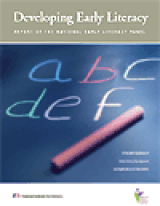After six years the National Early Literacy Panel released its study of preschool literacy research. I wrote about the panel’s preliminary report in 2003, so the final version has been a long time coming.
There’s nothing too surprising here: The panel found that teaching the alphabet, the sounds of letters, and vocabulary, as well as developing oral language and print knowledge in small children are important foundations for learning to read later on.

But the report’s strong focus on the effectiveness of code-related interventions, and weaker findings on the importance of vocabulary and background knowledge, have raised some concerns in the field that the report could have some unintended consequences when applied to policy. The panel, which was chaired by Tim Shanahan and included other prominent researchers like Susan Landry and Anne Cunningham, did not make recommendations, and it doesn’t endorse running phonics drills with 3- and 4-year-olds. But it wouldn’t be surprising if some people interpreted the findings that way.
It is more likely, however, that the NELP study will be one of many sources that inform early childhood policy at federal, state, and local levels. The National Institute for Early Education Research, for example, released its proposals for the Obama Administration (as requested by the transition team) this week as well. Other advocacy groups, like PreK Now, have been hard at work to get the issue high on the agenda.
Eduflack, who has made a career out of promoting the research-based reading agenda, says the NELP is no National Reading Panel, which he worked closely with to craft and disseminate the recommendations in its influential 2000 report. The NELP report, he says, will have a lesser impact by itself, and will be “one of many tools” for improving preschool literacy.
He has some recommendations for the stakeholders. First, he writes, they should come up with three top issues (although he doesn’t say what they should be). He agrees with PreK Now about the need for an early childhood education czar (isn’t that what they called Reid Lyon?). Then they must build a coalition to push the agenda and take some bold steps to move it forward.


